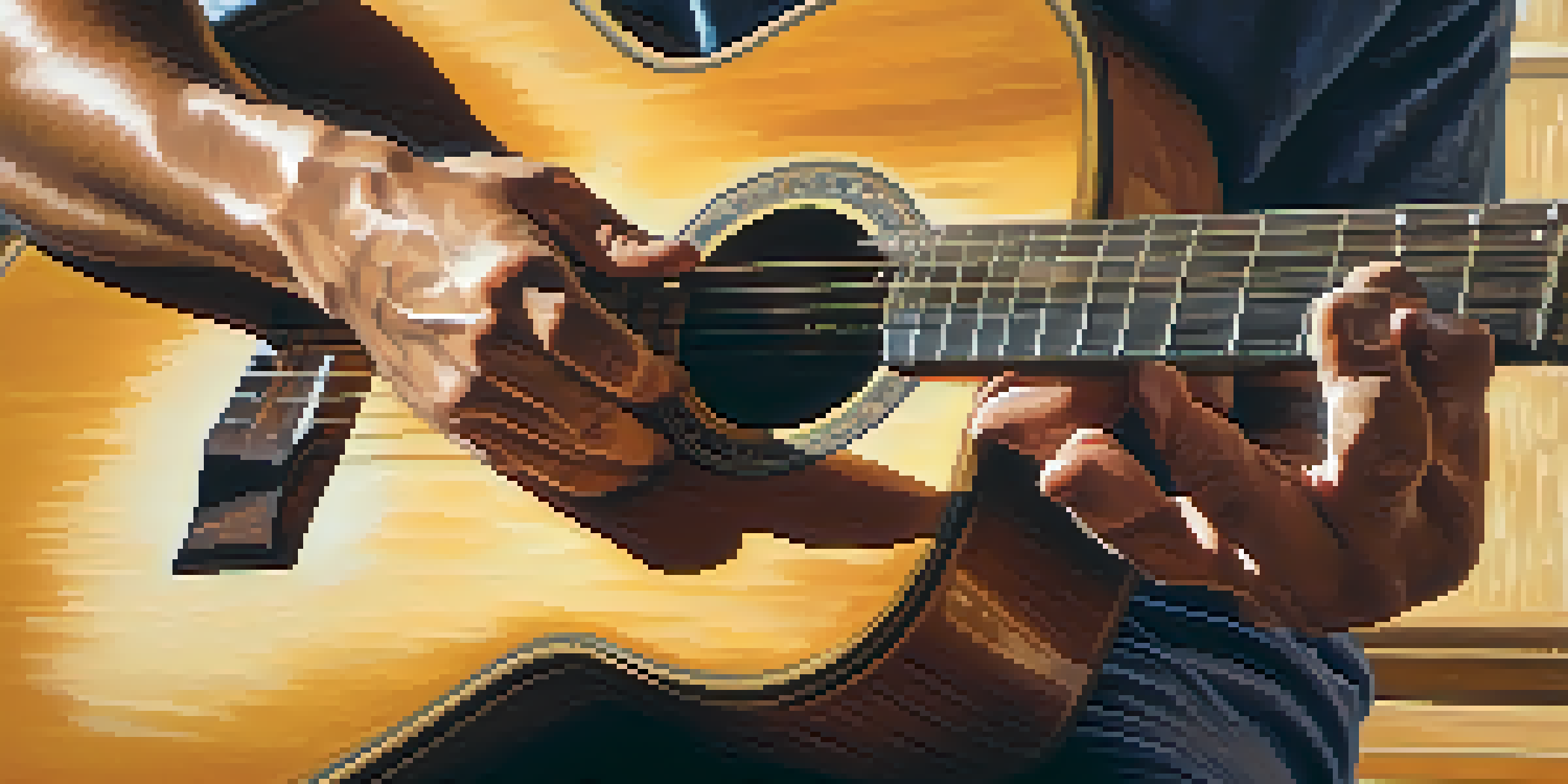How to Prepare for Your First Guitar Performance with Ease

Understanding the Importance of Preparation
Preparation is the cornerstone of a successful guitar performance. It not only helps you master your pieces but also boosts your confidence. Think of it like a chef preparing a meal; the more effort you put into gathering ingredients and planning, the better the dish will turn out.
Success is where preparation and opportunity meet.
Many musicians find that the more they practice, the less nervous they feel. This is because familiarity breeds comfort. By preparing in advance, you're setting yourself up for a smoother experience on stage.
Ultimately, preparation allows you to focus on the joy of playing rather than worrying about mistakes. When you know your material inside and out, you can engage with your audience and enjoy the moment.
Choosing the Right Songs for Your Performance
Selecting the right songs is crucial for your first performance. Choose pieces that resonate with you and showcase your skills without overwhelming you. Just like a painter selecting a canvas, your song choice should reflect your unique style and capabilities.

Consider the audience too; pick songs that they will enjoy and connect with. A well-chosen setlist can create a beautiful atmosphere and make the experience memorable for everyone involved.
Preparation Boosts Confidence
Thorough preparation allows musicians to master their material, leading to greater confidence and a more enjoyable performance.
Finally, be mindful of the song's length and complexity. Aim for a mix of familiar tunes and perhaps one new piece that stretches your abilities, balancing challenge with comfort.
Setting a Practice Schedule for Success
Creating a structured practice schedule can significantly enhance your preparedness. Allocate specific times each week dedicated solely to practice, treating it like an important appointment. This can help you develop a routine and ensure consistent progress.
The more you practice, the better you get, the more freedom you have to create.
Incorporate various elements into your practice sessions, such as warm-ups, technique drills, and full run-throughs of your setlist. Mixing up your routine keeps things fresh and maintains your motivation.
Lastly, remember to include breaks to avoid burnout. Just as athletes need rest days, so do musicians. Allowing your mind and fingers to recuperate will ensure you're sharp for the performance.
Rehearsing with Friends or a Band
Rehearsing with friends or a band can provide invaluable feedback and camaraderie. Playing with others mimics the live performance experience, helping you feel more comfortable in front of an audience. Plus, it’s a great way to share ideas and learn from one another.
Don’t hesitate to invite a few trusted friends to watch a practice session. Their encouragement can help build your confidence and provide constructive criticism that you might miss on your own.
Choose Engaging Songs Wisely
Selecting songs that resonate with both the performer and the audience enhances the overall experience and comfort on stage.
Additionally, practicing together fosters a sense of teamwork. When everyone is on the same page, it creates a supportive environment that can alleviate performance anxiety.
Visualizing Your Performance
Visualization is a powerful technique used by many performers to enhance their confidence. Spend a few quiet moments imagining yourself on stage, playing effortlessly and receiving applause. This mental rehearsal can help reduce anxiety and prepare you for the real thing.
Picture the venue, your audience, and even the sounds of your guitar. The more detailed your visualization, the more effective it will be. Just like an athlete visualizes winning a race, you can envision yourself delivering a stellar performance.
Incorporate this practice into your routine, perhaps before each practice session. By regularly visualizing success, you’re conditioning your mind to expect it, making it feel more achievable when the time comes.
Preparing for the Day of the Performance
As the performance day approaches, it's important to have a game plan. Start with the basics: ensure your guitar is in good condition, your strings are fresh, and you have all necessary equipment. Think of it as packing for a trip; you don't want to forget anything essential.
Arrive at the venue early to familiarize yourself with the space. This will help you get comfortable with the atmosphere and the setup. Walking around can also ease your nerves, allowing you to soak in the vibe before you take the stage.
Embrace and Learn from Performances
Every performance is a valuable opportunity for growth, so it’s important to enjoy the experience and reflect on areas for improvement.
Finally, take a moment to breathe and relax before you perform. Engaging in deep breathing exercises can help calm your nerves and put you in the right mindset to shine.
Managing Performance Anxiety
It's completely normal to feel nervous before a performance. Even seasoned musicians experience performance anxiety. Acknowledging your feelings is the first step; everyone gets a bit jittery, and it doesn’t mean you’re not ready.
To manage anxiety, try focusing on the music rather than the audience. Remind yourself that your goal is to share something you love, which can shift your perspective from fear to excitement.

Additionally, practice grounding techniques, like focusing on your breath or counting to ten. These small strategies can help center you and keep your mind from racing just before you take the stage.
Enjoying the Experience and Learning from It
Finally, remember that a performance is meant to be enjoyed. Embrace the moment, and don’t be too hard on yourself if things don’t go perfectly. Just like a good story, performances are about the journey, not just the destination.
After your set, take a moment to reflect on what went well and what you can improve for next time. Each experience, whether good or bad, contributes to your growth as a musician.
Most importantly, celebrate your accomplishment! Performing for the first time is a significant milestone, and you should be proud of your bravery and efforts.